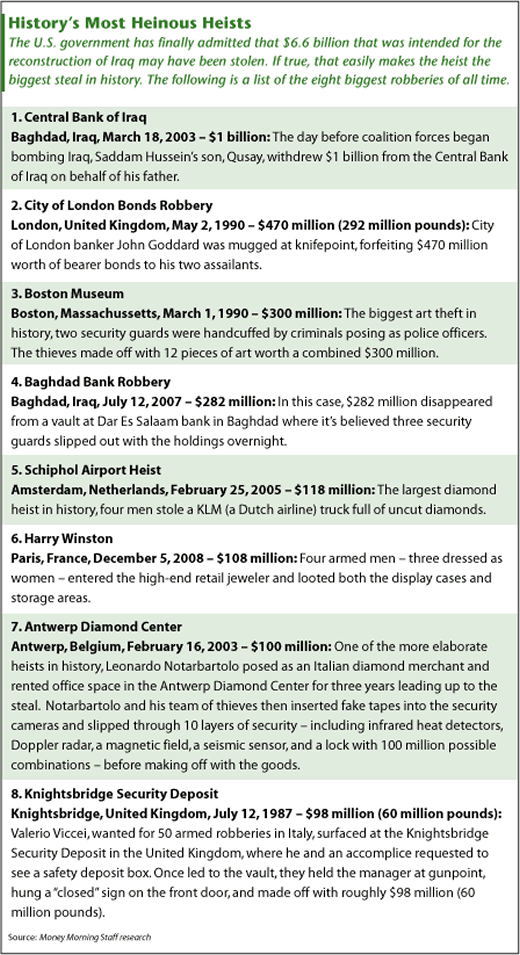U.S. Military Responsible for the Biggest Heist in History
Politics / US Politics Jun 17, 2011 - 07:34 AM GMTBy: Money_Morning
 Jason Simpkins writes:
For nearly a decade, U.S. military operations in the Middle East - Iraq in particular - have been criticized as a cumbersome and costly burden on the American taxpayer.
Jason Simpkins writes:
For nearly a decade, U.S. military operations in the Middle East - Iraq in particular - have been criticized as a cumbersome and costly burden on the American taxpayer.
That accusation gained new credence this week when the Pentagon finally acknowledged that nearly $7 billion of Iraqi oil money might have been stolen.
And what's worse is that the U.S. taxpayer could end up paying for the mistake.
Following the March 2003 invasion of Iraq, the United States liberated, or seized, billions of dollars of assets from that country. But since Iraq had no banking system, the money - much of which came from Iraqi oil sales - was placed in an account at the Federal Reserve Bank of New York.
From there, large pallets of shrink-wrapped cash were periodically loaded into tractor-trailer trucks, driven to Andrews Air Force Base in Maryland, and airlifted to Baghdad. Some $12 billion of cash was flown to Iraq in the months following the overthrow of Saddam Hussein.
But not all of that money is presently accounted for. Roughly half of it - $6.6 billion - has disappeared.
"It may have been stolen. It was vulnerable to fraud and waste and abuse," said Stuart Bowen, U.S. special inspector-general for Iraq reconstruction. "If it were stolen, it would be one of the most significant financial crimes in history."
The money was vulnerable to fraud and abuse because many U.S. officials didn't have the time or resources to properly track its distribution.
Upon arriving in Iraq, the cash was stored in U.S. military bases and in the basement of one of Hussein's former palaces. From there it was packed into gunny sacks and driven in pickup trucks to Iraqi agencies and contractors, according to the Los Angeles Times.
Bowen says Iraqi officials have been less than cooperative during the process of tracking down the lost funds. Among other things, they have not authorized the Federal Reserve to release account information to U.S. auditors, despite requests over several months.
"We will only get to the bottom of this if we get cooperation from the Iraqi government," he said.

Meanwhile, Iraqi officials have threatened to go to court to reclaim the money. They argue that according to a 2004 legal agreement, the United States was responsible for safeguarding the liberated funds.
"Clearly Iraq has an interest in looking after its assets and protecting them," Samir Sumaidaie, Iraq's ambassador to the United States, told The Times.
That means U.S. taxpayers, who already have coughed up $61 billion for reconstruction and development projects in Iraq, could be on the hook for another $6.6 billion.
Members of Congress, who are under pressure to reduce U.S. debt and balancing the budget, are already bristling at the notion.
"Congress is not looking forward to having to spend billions of our money to make up for billons of their money that we can't account for, and can't seem to find," U.S. Rep. Henery Waxman, D-CA, told The Times.
Source :http://moneymorning.com/2011/06/17/...
Money Morning/The Money Map Report
©2011 Monument Street Publishing. All Rights Reserved. Protected by copyright laws of the United States and international treaties. Any reproduction, copying, or redistribution (electronic or otherwise, including on the world wide web), of content from this website, in whole or in part, is strictly prohibited without the express written permission of Monument Street Publishing. 105 West Monument Street, Baltimore MD 21201, Email: customerservice@moneymorning.com
Disclaimer: Nothing published by Money Morning should be considered personalized investment advice. Although our employees may answer your general customer service questions, they are not licensed under securities laws to address your particular investment situation. No communication by our employees to you should be deemed as personalized investent advice. We expressly forbid our writers from having a financial interest in any security recommended to our readers. All of our employees and agents must wait 24 hours after on-line publication, or 72 hours after the mailing of printed-only publication prior to following an initial recommendation. Any investments recommended by Money Morning should be made only after consulting with your investment advisor and only after reviewing the prospectus or financial statements of the company.
Money Morning Archive |
© 2005-2022 http://www.MarketOracle.co.uk - The Market Oracle is a FREE Daily Financial Markets Analysis & Forecasting online publication.



